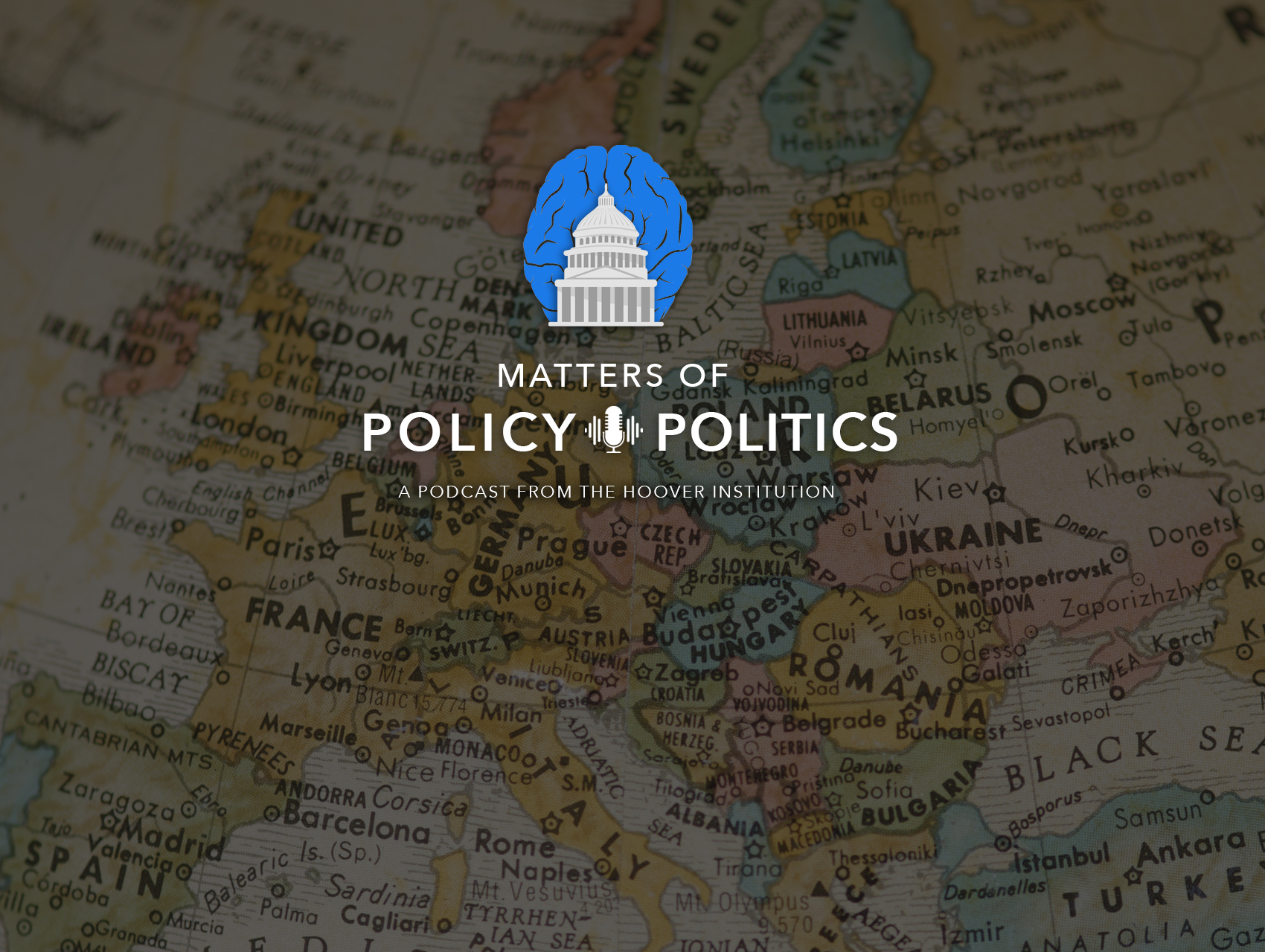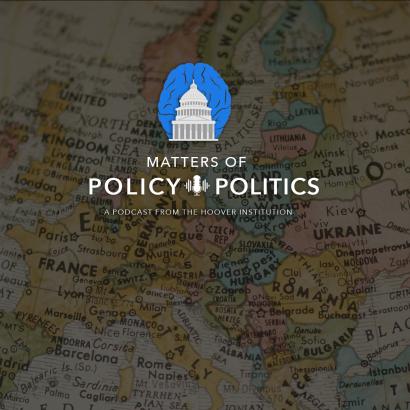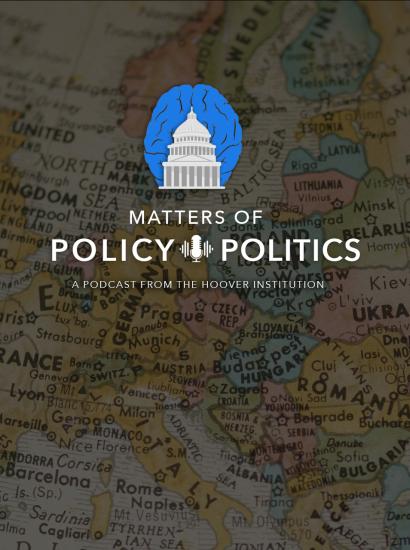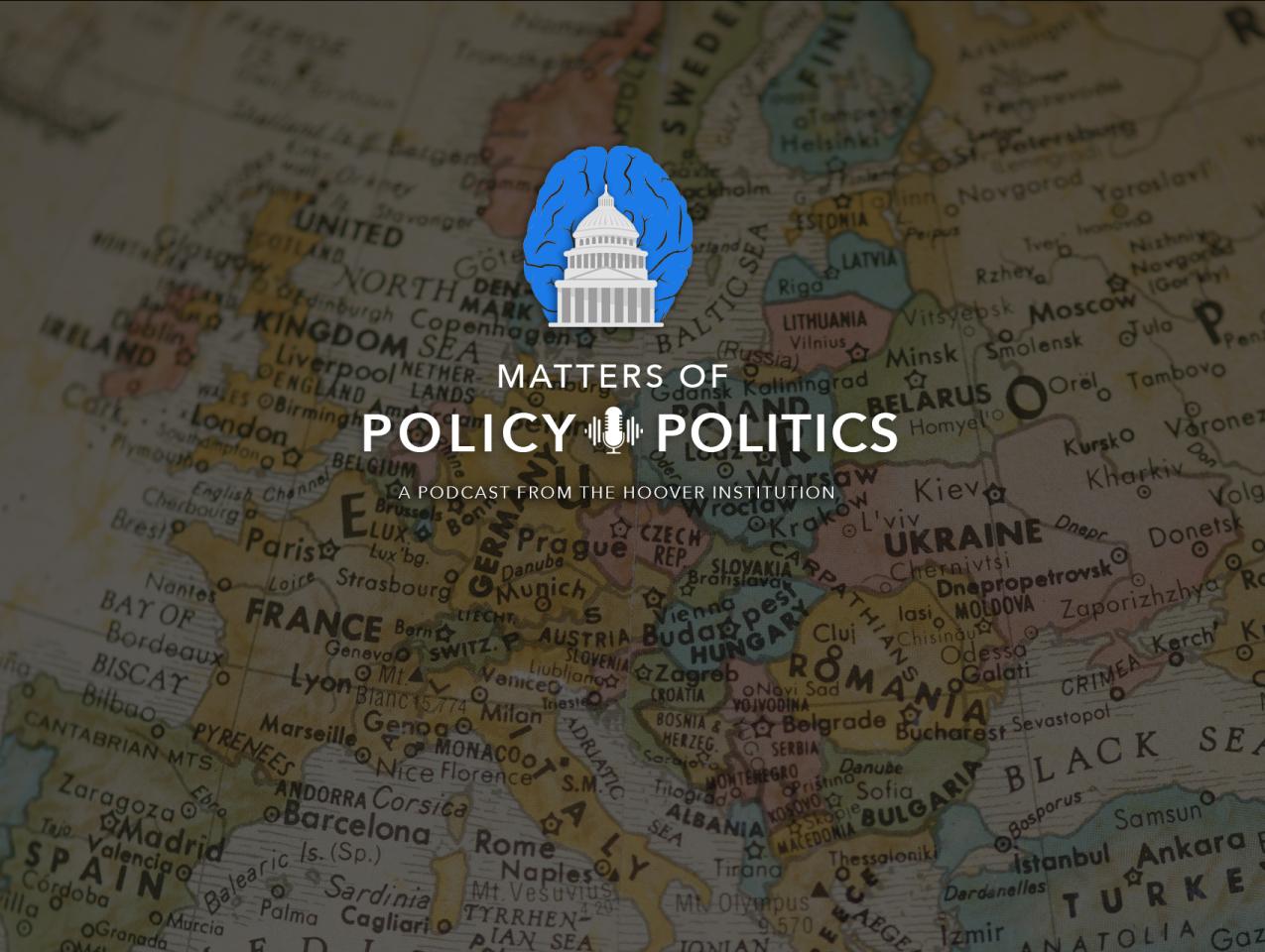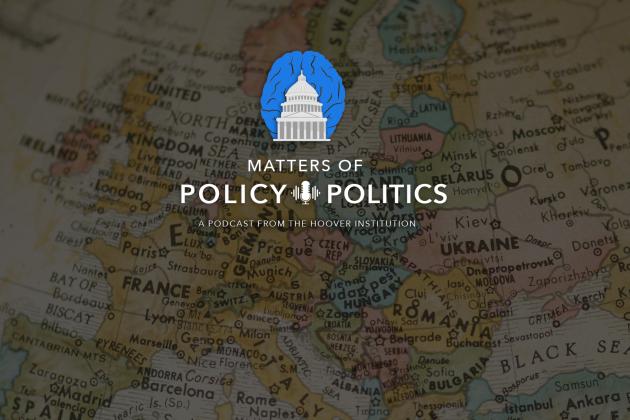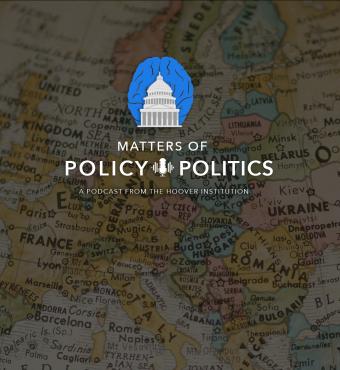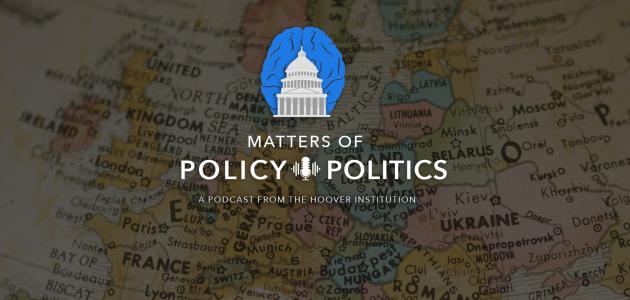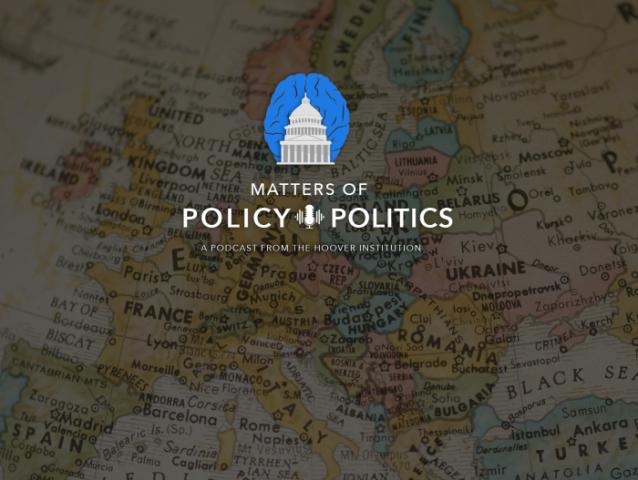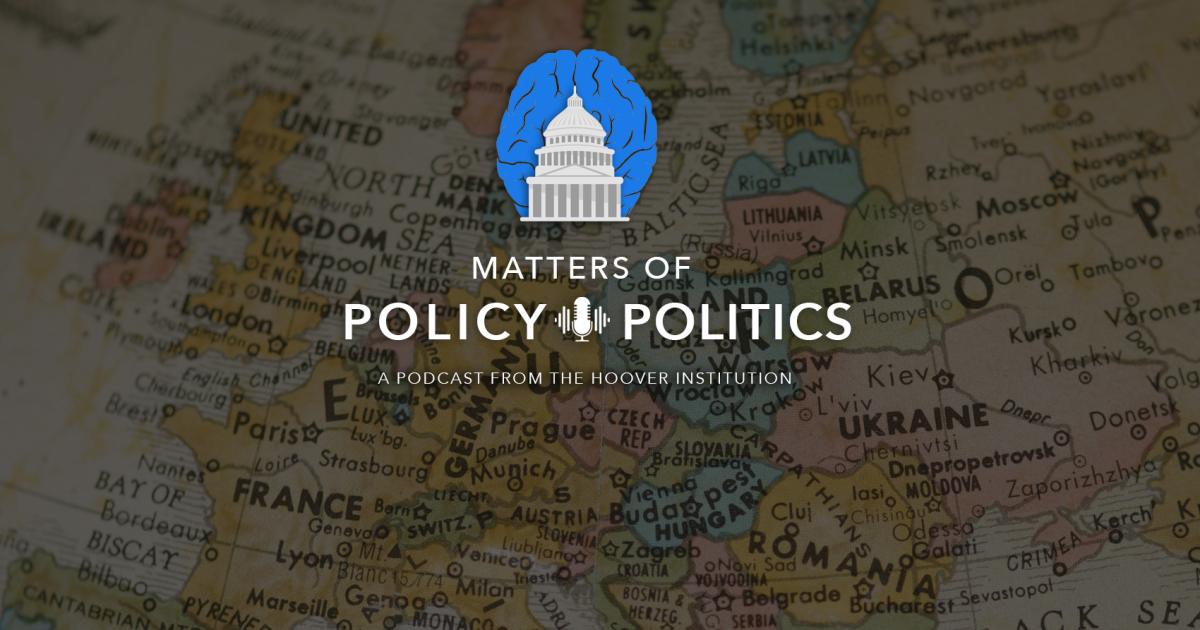- Contemporary
As Russia’s “special military operation” in Ukraine passes its one-year milestone, what are the prospects of hostilities spreading across the European continent? Tomasz Blusiewicz, a Hoover Institution research fellow and a historian of modern Europe and Russia, reflects on the war’s legacy tapping into his roots as a Polish native, a Russian university professor, and a scholar and observer of the Baltic states’ as they emerged from their Cold War existence.
>> Bill Whelan: It's Thursday, February 23, 2023, and welcome back to Matters of Policy and Politics, a Hoover Institution podcast devoted to governance and balance of power here in America and around the globe. I'm Bill Whelan, I'm the Hoover Institution's Virginia Hobbes Carpenter Distinguished Policy fellow in journalism. And I'm just one of several fellows who are doing podcasts these days, and I encourage you to go to our website and check it out.
Our website is hoover.org. You click on the tab at the top of the homepage, it says commentary. Scroll over to where it says multimedia and up will pop the podcast. You can subscribe to any or all of them if you'd like. You can also sign up for our monthly pod blast, which delivers our best of our podcast, your inbox, each and every month.
My guest today is Tomasz Blusiewicz. Tomasz Blusiewicz is a Hoover Institution research fellow and historian of modern Europe and Russia with an emphasis on the intersection of economics, trade, and politics in the Baltic Sea region. Between 2017 and 2022, he served as a history professor at the University of Tumin, which is located in western Siberia.
There he helped to establish the only remaining English language liberal arts college in Russia, the School of Advanced Studies. In March 2022, Tomasz Blusiewicz resigned for that university position in protest against the Russian invasion of Ukraine. As February 24th marks or will have marked, depending on when you're listening to this podcast, the one year anniversary of that invasion.
I thought it'd be worthwhile to get his thoughts on where the conflict stands and what may lay ahead for his native Eastern Europe. Tomasz, thanks for coming on the podcast today.
>> Tomasz Blusiewicz: Thank you for having me, Bill. It's a pleasure to talk to you and thank you for the introduction.
>> Bill Whelan: You're welcome. And anybody who's listening to us in Eastern Europe, I apologize if I did not get Tomasz Blusiewicz exactly correct. I am trying to do my best with my English language, trying to translate Eastern Europe. So bear with me, folks.
>> Tomasz Blusiewicz: Perfect.
>> Bill Whelan: Thank you very much, sir.
So let's start this, let's go back to March of February of 2022. Let's go back to February 24th of last year, actually Tomasz. And did you learn of the invasion that day?
>> Tomasz Blusiewicz: I did in the morning, I just woke up and grabbed my phone and saw the headlines in the morning.
And of course, as many people, I didn't really expect it. At least I didn't expect the scale of the invasion, so I was taken by surprise. And of course, that day has changed a lot in my life because it consolidated my decision to leave Russia as soon as possible.
Because I didn't feel secure anymore, given all that was going on around with unwarranted arrests and detentions of American citizens. The case of Brittany Greiner was in the news back then. So yes, I remember that day vividly, and it's not a good memory, of course.
>> Bill Whelan: And the average Russian would have learned about the invasion the same day, but I imagine they would have learned it through state media, perhaps.
And the state media would have broadcast it as what, not an invasion, but liberate Ukraine from neo Nazis, right?
>> Tomasz Blusiewicz: Yes, the official term is which means special military operation, which is the term kind of used up until today. Even though if you say war in the media, I don't think initially if you said war, you would could be arrested and actually sent to prison.
Now the rhetoric has changed. Vladimir Putin has, in his speech two days ago, not only two days ago, but also earlier, he paints the whole conflict as an existential struggle with the west. So I think it's okay now to use the word war, but you're right. Initially there was also this news about a ban to publish any non state accredited information.
And there were these new laws introduced in Russia about discrediting the army and essentially relying on non state validated sources. So, yes, of course, many Russians, especially in my circle, so to speak, it was English speaking university, so of course everyone was connected to the Internet and used various channels.
Like in Russia, a big social media platform is telegram, and so they're still connected there but also Instagram. Among my students, all of my students were on Instagram, so you could learn it from there as well. But you're right, most ordinary Russians would hear it probably on the TV or on the radio in the morning.
>> Bill Whelan: Out of curiosity, you are Polish by birth. How many languages do you speak?
>> Tomasz Blusiewicz: Right, I'm Polish by birth, I was born in communist Poland, 1987. I speak Polish, English, and Russian. I actually taught in Russian a few courses there. And my wife is Russian, and we speak Russian mostly at home with our daughter.
Surprisingly, I am also able to understand German, but I don't speak it fluently, though.
>> Bill Whelan: Okay, let's go back to Russia for a second here. I saw a news story last month, the university student in Tyumen was arrested, and she was later sentenced to three years in prison for posting a video online condemning the Ukraine invasion.
I think eventually her sentence was knocked down to 18 months. They took time off since she was in jail, but this does raise a question as to what, if any, free speech there is in Russia. What can university students do to protest the war?
>> Tomasz Blusiewicz: Well, so when I came to Russia, of course, I knew what kind of regime it was, I had no illusions there.
But there was a degree of free speech that was tolerated. And there were these radio stations, for example, Ekho Moskvy of Moscow. There were some newspapers, Novaya Gazeta, which I kind of called token free speech kind of remnants. I think the Kremlin wanted to keep it just to show to the world that, hey, we have opposition newspapers, but they have been shot, of course, after the invasion.
So when I came in academia, I would say I didn't see much interference initially. I could research whatever topics I wanted to. I actually came to Stanford for a conference on the 100 years of Baltic independence, that was in 2018. It was held at Stanford here, and it included some prominent guests, foreign ministers from the Baltic States.
And the university didn't mind me going. I mean, they didn't say anything, so, it was relatively free in that sense. But things have changed markedly. First after Navalny's poisoning, that was August, I believe, 2020. Then COVID came, which became the major topic for everyone. And then, of course, after the war, I think the switch from repressive regime to a totalitarian one has been rather swift and rather all encompassing.
I would say it was pretty dramatic in that sense, so now there's no freedom of speech whatsoever.
>> Bill Whelan: So let me throw a hypothetical attitude, let's suppose that you did not leave the university. Let's suppose you're still teaching in Western Siberia. And let us suppose that on the one year anniversary of the invasion, that the New York Times, the Washington Post, Los Angeles Times, the Wall Street Journal.
An American publication, asks you to write about the war and the mood in Russia, and you write a very critical piece about the war in Putin. What would happen to you?
>> Tomasz Blusiewicz: So here, what we need to understand is that. The censorship in Russia is oppressive, but it's also selective.
So the article would have to be noticed, the article would have to reach the Kremlin or reach some visibility. So it depends on that, if it reached significant visibility. Of course, if it's New York Times, automatically, it does. No question about that, so I would be fired the next day, absolutely.
And because I'm a historian and I taught courses on the European Union, I actually was the director of a master's program there in international relations, I just could not avoid certain topics. Like, for example, I had colleagues there who are philosophers and they're still there, philosophers from Italy, for example.
They can teach the philosophy course without issues, of course and there's no obvious reason for them to comment on the current situation, right? So, but given my area of specialty, of course, yes, an article like that automatically lead to probably deportation.
>> Bill Whelan: Tomasz, how do you suppose students at that university are processing this war?
This is not the first time Russians have had to maul a war, and perhaps maybe not a popular, actually, I don't know if the war is popular or not within Russia itself. You could address that better than me. But, for example, you would have had Russian university students back in the early 1980s, late 1980s, excuse me, dealing with Afghanistan, not a popular war for Russia back then.
So the Russian kids right now, those kids at school right now, how do you think they're looking at this? Cuz, I'm asked this because these are obviously educated kids. These are kids who I assume have access to news outside of Russia, so they can process this on several levels.
>> Tomasz Blusiewicz: Right, Bill, thank you for this question. I have so many things to say about this that I don't even know where to start. I'll start by saying I wrote an article recently about this in Russian, and I published it on an Instagram platform called Doha, which is a student run kind of a newspaper and it's pretty big.
It has more than 100,000 followers on Instagram and most of my students follow it. And I wrote an extended essay, about 5000 words about that. So those of the listeners who can read Russian can go there, I'll try to have it translated into English sometime soon. But in a nutshell, I'll start by saying that when I came to Russia, I was surprised by the radical moods of the students.
I could see it in the way they dressed, the subcultures there, they were all being pro Putin. Among people who were 18, 20 was the most per se and unfashionable thing you could be. And actually, there were some situations at the university, there were some trade union organizing and so on where I wasn't fully involved in supporting student movements.
So to speak, grassroots movements, mostly because I couldn't do it because this could lead automatically to me being kicked out from the university. So initially, some students actually had maybe not, well, complaints, but they were slightly disappointed that I didn't support their anti regime activities and their mood overall, mood stronger, right?
But then, of course, things have changed. As I said, after Navalny's poisoning, there were significant protests in Russia in which actually, my wife's brother, who's now 23, he was 20 then, so he was like a third year student. He participated in that. I remember myself and my wife calling him, kind of advising him to be very careful because he would get phone calls from the administration of the university saying, if you go on that march, there were these marches.
It was, I think, after Navalny got back from Berlin in January, I believe, 21, there were these marches and he participated in them. And a lot of students participated and some of them faced consequences. Some students, a few of them were, so to speak, few of them were actually kicked out from the university.
But this was not a massive or kind of totalitarian repression yet, more kind of finger waving and warning towards students. So the students in Russia certainly are the most vocal, the most active, the most engaged group in Russian society that, both in terms of protests, both in terms of online activity visibility, they are the people who organize the protests more than anyone else.
One other thing I would say is that, yes, the college where taught, excuse me, was kind of a special place because you had to know English very well to get there.
>> Bill Whelan: Right.
>> Tomasz Blusiewicz: But I also taught at the main Russian university. Just kind of think of a Arizona state in the US, a mainstream state funded and not state like Arizona, but state, Federal state in Russia, funded university.
And there this mood of, I mean, first of all, pro western attitudes. In young students, you see this not so much in their ideology yet, but their preferences in clothing, music. I always told my friends, I don't know anyone in Russia, for example, listens to Chinese music or watches Chinese films.
Korean music, yes, right. Japanese culture, not to mention Hollywood, of course, and American pop culture. So you see this by their kind of cultural choices, right?
>> Bill Whelan: Right.
>> Tomasz Blusiewicz: So the state university, they had groups of students who were active in Kremlin sponsored kind of youth organizations, so to speak, that there was a small group, right?
So there, one had to be more careful with them, for example, because this is a real story. One time I was reported by one student to my dean, so to speak, that I talked about Stalin's repressions, kind of in a, according to the student, in a aggressive and offensive to Russia, I don't know, way.
Anyways, I was kind of not warned because my dean is also a person of liberal views. But kind of I was given to understand that there are some students who might report me to the authorities for giving a history class on the gulag, for example. Well, it's not like talking about Gulag was forbidden in Russia, but talking about it in a certain way where you accuse the Soviet state of being, of committing crimes against humanity or something like that, right?
So this could get you in trouble. But as I said before the war, most academics would not really be face any disciplinary measures for doing something like that. You would have to attack the Kremlin directly. But after the war and all this interest in Russia, what's called in Russia history politics, right now we see more and more recently, for example, in Volgograd, there were commemorations of the Stalingrad battle.
And Vladimir Putin came.
>> Bill Whelan: Right.
>> Tomasz Blusiewicz: They renamed the city Stalingrad.
>> Bill Whelan: Right.
>> Tomasz Blusiewicz: And if I'm not mistaken, they also established a monument to Stalin just next to a monument to the victims of the repressions. I don't remember the exact details, but I think that's true. So you see this turn towards glorifying, certainly, Soviet war effort.
I mean, it's been there earlier, but now also kind of whitewashing Stalinist crimes and forgetting about that part.
>> Bill Whelan: Right, so Putin went to Volgograd. This was the 80th anniversary of the end of the battle with the Nazis in Stalingrad. And on Thursday, he was celebrating Defender of the Fatherland Day in Russia.
This used to be, I think, called the Soviet Army and Navy Day, and Putin renamed that to Fatherland Day. And news reports are correct, I think 70,000 people turned out and Putin apparently had to pay bunch of people to come out and celebrate. One final question about Russia, then I want to move on to Poland and the Baltic states.
Is there a historic parallel here that Vladimir Putin may be looking at? And that parallel would be Lyndon Johnson in America in the 1960s and that Johnson suffered great damage politically due to the Vietnam War, with college age Americans in particular. And the problem with college age Americans back in the 1960s were that, number one, they didn't buy the rationale for the war.
The government said that this is about containing communism, but college age students didn't see it that way. But then, secondly, Tomasz, they took it personally because they had young men their age dying in Vietnam. So this is what really spawned campus unrest, and it really undermined Johnson's presidency.
So much so he did not run for reelection in 1968. I'm not gonna talk about Putin leaving office because of this, not running for another term, if you will. But the question would be if a situation like the war with Ukraine, now a year old and showing no signs of ceasing, just becoming more and more of a bloodletting between two nations.
If you can see a Vietnam parallel here where college age Russians, the ones whose peers are losing their lives in Ukraine, if this unrest starts to build up.
>> Tomasz Blusiewicz: Right, well, first of all, as you have mentioned, the peril doesn't work in a sense that Putin doesn't face any elections.
>> Bill Whelan: Right, and the second parallel would be one, obviously, of just free speech. Whereas in America, a student can go out and do everything from protest to lie in the street to burn a flag if they so choose.
>> Tomasz Blusiewicz: Yes, but, so the verification for, or let's put it this way.
Well, the factor that will determine whether this resistance among young people is big enough is the battlefield. It depends on how successful Putin's regime is in conscripting, continuing the conscription. And we've seen, and we can say it with 100% certainty, Putin's regime did not want to go ahead with this mass conscription.
That they eventually did in September. They waited for that moment until the last possible moment, so to speak, after the defeats they had suffered near Harkey. So and they still don't want to. They called it a partial mobilization, they still don't want to announce a real mobilization kind of World War II style, precisely because of these reasons.
So the balance here, the equilibrium, is Russia is still a pretty populous country, 145 million people, and the question is how many young people are going to be willing to go and fight in Ukraine? So far, we see that the first wave of mobilization was, by and large, successful.
I mean, a lot of young people have left, but 200, 300,000, maybe even half a million. We don't know exactly. Young Russians were mobilized, so half a million people is a lot of new soldiers. So it depends on the numbers, right? If resistance spreads, so to speak, from the.
Because who are the people who have left Russia, let's say, in the past year? It's people who can find employment in other countries. So it's usually well educated people, often with IT skills or some other hard science skills that are easily transferable, and they can just work from their laptop, let's say, in Georgia or in Turkey or Kazakhstan.
It's people who know languages, my wife always tells me, and this is a statistic verified by the Russian state, only about 20% of Russians have what they call a foreign passport. They have two passports in Russia, internal one, which is just kind of an ID card, and a foreign passport, and only about 20% of Russians have it, which means only about 20% of Russians might have been abroad.
Right, so there is this big pool of Russians who don't have that opportunity. And the resistance or the unwillingness to go to war among them is still, I would put it this way. I see no enthusiasm for this war apart from some groups like the Wagner mercenaries and some extremists, I would say, or just young guys who really want to go to war.
There are people like that. But by and large, most Russians, especially in those distant republics like Buryatia, which is behind the Baikal lake, I actually have friends there. Most people don't want to go to that war, but they don't really have a choice because if they don't, they will have problems at home.
They will be kicked out from their job, their family will not get an apartment in a communal building and so on and so forth. And they don't have the luxury to think,, should I take the next train to Istanbul and work for an IT company there, or should I maybe go to Ukraine?
So they go there unwillingly, and they are dying in big numbers and it's a very sad story. But the resistance in the broad masses, so to speak, it's not a beautiful term, but let's use it is. The active resistance is so far not strong among those people, right?
And one other thing I would say is that what differentiates Putin's regime from Stalin's regime is that Putin's regime actually lets people leave Russia. They keep abuse on them, call them traitors and so on. There's even been talk, I think, proposed confiscating their property, but they let them go, interestingly, right?
>> Bill Whelan: Right.
>> Tomasz Blusiewicz: That would not have happened under Stalin.
>> Bill Whelan: Okay, let's shift, and let's talk about your homeland, if you will. Poland, where were you born in Poland?
>> Tomasz Blusiewicz: In a small town right on the border with Belarus, so there is a city in Belarus called Brest.
It's a place maybe known to some listeners who known World War II story. Yes, exactly or the peace treaty was signed in 1918. So I was born on the other side of the river, which is now in Poland, a small town Terespol, right on the border with Belarus.
And I grew up there as well. So Poland joined NATO in 1999.
>> Bill Whelan: It joined the European Union in 2014. Tomasz, I have-.
>> Tomasz Blusiewicz: In 2004.
>> Bill Whelan: 200, excuse me, I have friends who do business in Warsaw. They fly back and forth frequently. And I talked to one of them before doing this podcast, and he said, here's how I view Poland.
He said, I call Poland the Texas of Europe and I said, why? And he said, because you go there, and it's sort of like being in Texas. People are very welcoming, people are very entrepreneurial. There's kind of a kind of just sort of a wide open feeling there, and they're very fond of Westerners.
I'm curious if you've believed this the same in terms of trusting Westerners and if there is a trust of the Westerners and embrace of the West, when did this come about? Because if I know my Polish history correctly, Poland traditionally has been a rather homogenous nation, and it's always been in a very difficult spot on the map, caught between great powers.
So explain today's Poland.
>> Tomasz Blusiewicz: Wow, you're asking me for a lot, but let's start with Texas.
>> Bill Whelan: Yeah.
>> Tomasz Blusiewicz: First of all, I wish we had so much oil and other natural resources that would have been great, would have helped us to be less dependent on Russia in many ways welcoming for westerners.
I would say when you go to Warsaw, what you see is definitely a pro-business attitude of most people. Poland is one of the most dynamic economies after 89, I think few countries definitely in Europe, but even in the world, have grown so fast. There is a book written about it by my friend at the World Bank, Marcin Piatkowski, Poland, the growth champion, and that's true.
And if you go to Warsaw, you see it. The skyline of Warsaw looks no less shabby than, let's say, Dallas or even Houston, right? So a lot of new skyscrapers, a lot of new investments in infrastructure. So in this sense, I think Poland is also very, at least, let's call it Warsaw.
Warsaw is very, let's call it neoliberal in their economic, let's just call it conservative in economic views, kind of like Texas, open to business, open to foreign investment as well. Not sure about the cultural perils you mentioned being welcoming or trusting of westerners. Well, here I think the analogy with Texas stops, because it doesn't work anymore, because the Polish history, as you mentioned, is just a whole different story.
So you asked me, when did this Polish welcoming or sympathy or embrace of the West start? I would say it has never left Poland or abandoned Poland, Poland accepted Christianity from the West. I mean, it came through the Holy Roman Empire and through the Czechs, actually, in the 10th century.
So Poland has always been a part culturally of the western core, right? And this kind of differentiates it from, let's say, Ukraine, which, of course, receives Christianity, as we all know, from Greece. And of course, Greece is also part of western civilization. But after the fall of the Roman Empire, we all know the story, right, western, eastern Roman Empire.
So I would start with that. But then, of course, well, quick run through 10th century World War II, and Poland finds itself occupied by the Soviet Union. And then I would say this sympathy or this outlook that combined hope and kind of trust and this dream of being kind of liberated from the Soviet repression.
All these emotions that were there in the Polish nations, they really focused on the United States, right? Because, remember, during World War II in 1939, Poland had alliances with Great Britain and France. And then even though Britain and France declared war on Germany, it didn't help Poland much, right?
So the trust towards European powers in Poland got kind of little undermined. Not completely, though, because, of course, Britain, and especially Britain, France, maybe less so, did a great deal to help the Polish cause. Unfortunately, World War II ended, the front of World War II ended in Germany.
So there was physically no way Poland could have been liberated by the western powers. So after 1945, whenever someone thought about the possibility of ending communism in Poland, your thoughts would turn to the United States, because, of course, this was the only power who could help Poland do that, right?
So it was a kind of a psychological process, even for those Poles who didn't know much about the United States, its history. For example, most Polish people would not know that Texas became a separate republic, and there was a war with Mexico in the 19th century and so on.
But just because America was in confrontation with the Soviet Union during the cold War, of course, hopes of most of polish people turned towards the United States. And then after 89, Poland was given a chance to actually become a part of the Western alliance system, of the Western economic zone, of the free movement of people, capital, and ideas in the European Union.
And it has greatly benefited Poland. I think Poland is a country where support for the EU as an institution or as an idea is one of the highest in Europe, and for a good reason. Because an idea like Brexit in Poland wouldn't fly because too many people just have seen in their daily lives in their ability to, for example, work in western Europe and travel freely.
And just the development of Poland over the last 30 years has been amazing, I've seen it myself. I actually, we complained before this podcast about infrastructure in the Silicon Valley. Sometimes I even point to Poland as a country with better infrastructure than the Silicon Valley. If you look at availability of Internet, new highways, new trains, fast speed trains and all that, it actually looks more impressive than Caltrain, that's for sure, right?
>> Bill Whelan: What Tomasz is referencing is that we're doing this podcast. I'm in my office, but Tomasz is actually sitting in an automobile right now because his home nearby does not have Wi-Fi. Because we had windstorms which took out the Wi-Fi at least two days ago, I think, and he still doesn't have Wi-Fi.
And what we're joking about is that this is the great irony of living inside Silicon Valley. We'd expect the best in technology, but not always so. Tomasz, this is not 1939, Poland has not been invaded. It doesn't find itself caught between two powers but it does find itself in the middle of the war in at least this regard.
You have had Ukrainian refugees pour into Poland. At the same time, weapons are being moved across the Polish border into Ukraine. Question for you, how sustainable of a position is this for Poland?
>> Tomasz Blusiewicz: It all depends on Western resolve and support, because Poland can maintain the level of support for Ukraine, both humanitarian, but also military, economic, logistical.
If there is political will and the means to do it, especially in Washington but also in Berlin, in Paris, in London, and other European countries, and in the neighboring eastern European countries, the so-called Bucharest Nine. We just had a meeting yesterday, right, with Joe Biden, meeting with nine eastern European leaders.
So Hungary, Baltics, right, Romania and Czech Republic, Slovakia. So if there is this coalition, right, and the will of that coalition to maintain support for Ukraine, as President Biden says, for as long as it takes. Poland has no reason to feel threatened or feel like it won't be able to maintain this level of support.
I would say to the contrary, Poland is ready to do more. It's just as Anne Applebaum, one of the best experts on the region, says, Poland has done a great deal. But Poland is also a little worried about this incremental level of support to the Ukraine. And every time there is a discussion about new weapons that Ukraine needs tanks now, fighter jets, there's so much feet dragging and so much going back and forth, especially in Europe, right?
That this is what worries Poland, that because European countries, western countries are democracies, unlike Russia. There might be a change in the mood of the people, especially in Europe, where inflation is much more serious, the cost of living crisis is much more serious than in the US, primarily because of energy crisis.
So there is a worry that the European peoples, especially those who are further away from Ukraine and don't see an existential reason to really support Ukraine to such a degree that Poland does, and that's understandable. A country like Spain or Italy, why voters there would care so much?
I mean, most voters care about Ukraine, but it's a question of the degree, right. If your energy goes up by 300%, as it did in some European countries, then you have a problem because this is very fertile ground for parties that advocate making some kind of a deal with Russia.
So this is what worries Poland.
>> Bill Whelan: Right, and I think you're gonna see this play out to an extent in the 2024 presidential election here, Tomasz, where at least during the Republican primaries, you're gonna have some candidates raising questions as to America's priorities. You already have this kind of uncomfortable line coming out of the president's visit to Poland, where one lawmaker commented that he went to Poland, but he did not go to Ohio to observe a train wreck that had happened.
In other words, the president doesn't have his eye on his own country. Speaking of other countries, let's now shift to the baltic states, an area that you've studied very much. Let me give you a little anecdote here, Tomasz. About a decade ago, I took a Baltic cruise, really wonderful two-week cruise that left England.
It was a highlights cruise, and it included stops in Sweden and Denmark and Norway and Finland. The big prize was going to St Petersburg, which if you look at most American cruise ships now, they don't go to St. Petersburg. Apparently, this is one of the casualties of the war.
But there was also a stop in Estonia, in Tallinn, and it was a one-day stop. And a lot of the places we visited on the highlights tour, you might expect. We went to a 16th century we went to a very quaint old fishing village to see how Estonians used to live.
We saw the modern side of Estonia, very nice outdoor cafes to sit in the sunshine and have a beer, onion domed churches abounding and so forth. But we also went by a rather rocky beach and noticed a sign next to the beach, Tomasz, and the sign read, and I'm gonna butcher the Estonian here.
It read, Kurikoer, K-U-R-I-K-O-E-R, Kurikoer, which I think literally translates to evil dog. And what the guide said was that these signs were littered along the beaches of Estonia during the Cold War. And what they were telling the population was, don't even think about making a dash for the water and trying to get out of here.
I mention this because here you have a country that was absorbed by the Soviets, what, 1940, I believe, now no longer Soviet republics, but here they sit next to Russia. And a few years ago, if you and I were having this conversation about Putin, we might have been talking about his ambitions with regard to the Baltics, but we don't talk about that right now.
We talk about Ukraine but let's now shift to the Baltics. Does Putin still have designs on those states?
>> Tomasz Blusiewicz: Excellent question, Bill, and what an anecdote indeed. The Baltic Sea was seen by the peoples of the Baltic states, Lithuania, Latvia, Estonia, as this bridge to the West. And indeed, there were many contacts and many exchanges in trade and ferries going to Sweden.
And actually, it was not so rare. It's not like the Baltic peoples were actually held in a prison by the Soviets. Actually, Tallinn was one of the most visited by foreign tourists capitals in the Soviet capitals of republics in the Soviet Union. The Soviets wanted to build a kind of a model republic, especially out of Estonia, and they really liked inviting tourists to Tallinn.
They've built a few of the best hotels in the Soviet Union were in Tallinn. But indeed, if you thought about leaving Estonia, and this goes back to my earlier point about Putin actually allowing dissidents just to go, you couldn't do it. I mean, you could do it. You could still board a ship and just never go back.
But then the soviet state could go after you and they could go after your family. So it was not a big deal if you were just alone and had no relatives and family and friends, but who was like that? No one, so it was always a tricky thing you could leave alone because there were these connections.
Trade ships, maritime ships were going back and forth, but of course, the Soviet state would go after you. Now, the Baltic states are obviously very small, so if Putin decided to invade, if there's no NATO troops there on day one of the invasion. It's not like the Balts have a lot of space to retreat, like kind of Ukraine fortunately had, right?
So Ukraine is kind of too big to be swallowed by Russia initially. And that's one reason why I was surprised with the invasion and so were many people, because I was trusting the western intelligence data about how many troops the Russians had. And I was like, that's not enough to overtake Ukraine.
So I was expecting some kind of, I think there was supposed to be a special military operation to take Kyiv. And then stage a coup or something. And this actually could be much more plausible in a place like Estonia, right? Because the country is just physically so small that Russia could do it.
For the Balts, the Baltic Sea is very important, and I think they are very optimistic right now, or I guess, satisfied that as they call them larger brothers, especially Sweden, but also Finns who are related to the Estonians. It's a similar language group, that they have plans, not just plans.
They have declared their intention to enter NATO. As we know, there's still some unhappiness about that in Turkey, especially about Sweden, but that's a separate discussion. So it looks like the Baltic Sea will soon turn into a kind of an inside NATO sea, which for the Baltic States is, of course, of existential importance.
So I think they are overall satisfied with the increasing NATO. Well, the troops that are stationed there and the political will to really support these countries, not just verbally, article 5. But with real capabilities, with real military technology and boots on the ground to make sure Putin doesn't even think about starting a war there.
Because again, actually a part of Poland where my family lives right now is called the Suwalki Gap. For those of the listeners who have not heard the term, it's the small piece of land between the Kaliningrad Oblast, part of Russia, the Russian exclave on the Baltic, and Belarus.
It's about 50 miles from Belarus to Kaliningrad. So, of course, if the Russians wanted to, they could stage a quick assault there and kind of disconnect the land bridge between Poland and Lithuania. And this way, disconnect the land bridge between the Baltic States and NATO countries. So this is, of course, very warring for the Baltic States.
But on the other hand, there are NATO troops stationed in the vicinity, including American troops in northeastern Poland. So this provides the necessary security. And there are NATO rotational battalions in Lithuania, mostly with German troops. This gives them confidence that they will not be left alone. And as long as these nations, these very small nations, have this confidence, they are very happy to make the investments and put in 2% of their GDP or more into defense.
And really make the sacrifices necessary to deter Russian aggressions, they are happy to do it, they are not gonna complain that this is unnecessary. The only thing they might be concerned about is the stability of, especially the US will to do so. And after Trump was elected, Donald Trump, there were some questions about this, whether his dedication to NATO is the same as it has been before in the United States.
Now, I think these after, I think after the invasion of Ukraine, we see that, as President Biden says, the United States and its allies stand united and determined to deter Russian aggression in the Baltic. And as long as it takes to support Ukraine, for Ukraine to liberate all or most of its territory.
So as long as this will is there, things are good. But again, we live in democracies, and as you have just pointed out, there are events such as the Ohio train crash, which can influence election results. And then something can happen that will put a question mark over the cohesiveness of NATO.
So this is the source of worries, I would say, for most Eastern European peoples.
>> Bill Whelan: Final question, Tomasz, and I'll let you get out of that car, enjoy some fresh Silicon Valley air. Here we are at the one year anniversary of this conflict. I'm not gonna ask you how much longer you think it goes, because I don't think anybody knows.
It appears just to be a very ugly war of attrition. Hard to see a peaceful settlement right now without one or both sides really capitulating on some of the stances they've taken. The question would be not really when the war ends, I think, Tomasz, but the fear of the war expanding into other nations in eastern Europe.
So the question for you is, do you fear of the war expanding? And if so, which country should be concerned at this hour or should be countries, plural?
>> Tomasz Blusiewicz: Well, so I'm gonna start again with my personal experiences. So after I left Russia, I actually went to Poland, where I was there for two months, staying with my parents, waiting for all the documents and paperwork to be done for me to come to the United States and start my position here at Hoover.
And the fear of the war expanding was the greatest in the first few weeks, where, of course, the expectation was that Ukraine would fall. That there would be Russian troops directly on the polish border, that Belarus would be firmly with Russia. And that Russians would just want to go on, seeing the success kind of like Hitler in 39, seeing the success of the blitzkrieg.
They would be emboldened to march further towards God knows where, Berlin. Or as there are these bumper stickers in Rochadai so many times, it says something like 1941/45, we can do it again. And Berlin, so let's take Berlin again. And you can hear it in Russian. And now after the Germans decided to deliver some tanks, you can hear it on Russian TV every day, we should take Berlin again.
But now, I think most eastern Europeans kind of make jokes of these Russian intentions of taking Berlin because they see Russia mobilizing a lot of resources and Russia not being able to take Bakhmut for half a year. So we are looking at this and we are like, well, this Russian army, as they called it, the second army of the world, might not be so strong as everyone thought it was.
So I would say that with every success that Ukraine has on the battlefield and with every new bill passed in Congress of American support for Ukraine, I think these worries of the war expanding actually diminish. I mean, there's one area where they do not diminish, it's of course, the nuclear escalation.
But that's a separate discussion, right? This is a kind of a factor that you can't put a figure or a number to it, the likelihood of it happening. It's just impossible. But right now, in terms of conventional war, I think no, to the contrary. We see the Russians moving their troops from Kaliningrad.
They're moving their troops from the Finnish Karelia, right area next to Petersburg. They move everything they have to Ukraine, and they are not able to take Bakhmut. So I would say no, it's actually the willingness to deter Russia grows. And I think the idea that this war can end by means of Ukrainian victory is growing and by means of.
Doing that, you can actually limit this conflict just to Ukraine rather than it expanding. Because I think military experts would agree with me here that Russia doesn't have resources now to open a new front. That would be a big mistake, unless something major happens in geopolitics, like, let's say China decides to fully support Russia militarily and put down all of its weight in support of Russia, then yes.
But I don't think we are seeing that yet. I mean, there are some signs the Chinese are willing to do more than they have been doing so far, but hopefully they don't. And as long as there's no other major power supporting Russia, and as far as western resolve and support remain strong.
I would say this fear of, as you say, conflict expanding to other areas doesn't have justification in reality.
>> Bill Whelan: So note two things after a year of fighting Tamasz. One, Putin gambled and lost big in one regard. He made the calculation, as you mentioned earlier, that he'd go into Ukraine and he would decapitate the government right away.
He would take out Zelenskyy, he would take over Kyiv, and the rest of the country would crumble. And a year later, that's obviously failed, Zelenskyy is still with us. Putin did not take him off the airwaves, which ties into the second issue, which is that Putin has been losing an information age war, if you will, in the images that you see.
For him to settle the Russian people on expanding this war and going elsewhere, I think you'd have a problem in this regard. You don't see after a year fighting any kind of mythological modern day Red army. Instead, images wise, you see just the opposite, you see tanks being blown up.
You see Russian soldiers surrendering and so forth. So Putin kind of loses on the airwaves in that regard. Social media, modern day media, he cannot control figure this way. The Germans invaded the Soviet Union in 1941, helped in part by the image, the myth of the invisible German army after what it did in western Europe.
Hard for Putin to go to the Russian people and talk about an invisible army right now, given what's happened the past year.
>> Tomasz Blusiewicz: Right but the problem here is that if we look at World War II 1941, everyone said that Russia is finished, right? British intelligence in August, 41, German generals said the Red Army has been destroyed, now it's just mopping up operations.
And here we touch upon the topic of this mysterious, deep Russian psyche or soul that can really surprise the world and do something that logically and technically seems impossible. And I think this is what Putin has been trying to do for the past few months, he wants to sell this conflict and explain the failure to defeat Ukraine, which really is kind of it's for a Russian patriot, or let's say a nationalist, it's kind of a disgrace, right?
Ukraine, everyone said in Russia, it's not a real country, doesn't have a real army, la la la. And suddenly it turns out the whole might of the Russian army is not able to take, not able to make any progress for the past half a year. And it's ludicrous when they celebrate, as they did, the taking of Soledar, this town of 10,000 people, as if they took at least Kyiv.
So this looks a little ludicrous. But then Putin is trying to say, well, we are not fighting Ukraine anymore. So that's why we need all these sacrifices, because we are in an existential struggle. That's what he said yesterday, an existential struggle for the very survival of our nation.
And now the question is, will the Russians buy it or not? And it's difficult to say, I can't make a prediction here. If they buy into this, then we have a problem, because the Russian society has shown historically that it can overcome the worst crisis that seems unimaginable to us.
The big smooth in the 17th century, so the Polish invasion. Russia was without a ruler for ten years or so. Then Napoleon's invasion, right? Napoleon was in Moscow. Then World War I, they lost world War I. There was a revolution, right? It seems like Russia is kind of out from the world stage, and then 20 years later, they are a superpower, right?
So they have this mystical, magical ability, like this phoenix from the ashes, just to rise when the circumstances seem. The odds seem stacked up against them and I'm a little afraid about this scenario. And this is what the Kremlin is trying to do, is to kind of mobilize society for an all out war, kind of World War II style.
And now the question is, will the Russians buy this? I have a hope that they will not, because there's still a difference between Napoleon taking Moscow. Or Hitler invading in 41, where indeed, it was a wholly patriotic war for them, because Hitler was bent on destroying not just the state.
But he was bent on destroying or at least enslaving Slavic peoples and other peoples right in the region. So, absolutely, it was the Russian people and all the peoples of the Soviet Union had a good reason to fight in this war as a matter of life and death.
And here with Ukraine, I think it's more questionable we see a lot of apathy. A lot of commentators talk about apathy of Russian society. Even the stage rallies in the Luzhniki Stadium in Moscow, they have to pay people to go there. And it's state functionaries, it's people who are on a state budget.
So they work, let's say, for the railways or the post office. They can't say no, right? So I don't see that kind of zeal, because the cause of this war for Russia is just not just. And I think the Russian people feel it intuitively, and I hope they won't buy into this whole story of the west would have attacked us anyways.
The west wants to impose its norms, LGBT marriages and all that, and wants to turn our children into God knows what, right? I I think the Russian people feel that this is a fake kind of narrative, and Russia is not on the right side in this war. And I hope they won't buy into this and will not allow the regime to send more and more young people to die on the front.
I hope they will wake up one day and see that this war has not been started for a good cause and Russia is in the wrong here. So that's my great hope. But this is a matter of human psychology, is very difficult to make predictions here.
>> Bill Whelan: Well, Tomasz, we're going to end on that hopeful note.
And thanks for coming on the podcast today, I really enjoyed this conversation.
>> Tomasz Blusiewicz: Me, too. Thank you, Bill, it was a pleasure to talk to you.
>> Bill Whelan: You've been listening to Matters of Policy and Politics, a Hoover institution podcast devoted to governance and balance of power here in America and around the world.
If you've been enjoying this podcast, please don't forget to rate, review, and subscribe to us. If you wouldn't mind, please spread the word, your friends to have a listen. The Hoover Institution has Facebook, Instagram, and Twitter feeds. Our Twitter handle is @hooverinst, that's spelled at hoover I-N-S-T. Tomasz Blusiewicz is also on Twitter, his Twitter handle is @tomblusiewicz.
I'm gonna spell that out for you, that is T-O-M B-L-U-S-I-E-W-I-C-Z, @tomblusiewicz. You can also follow his work if you sign up for Hoover's daily report. For the Hoover Institution, this is Bill Whalen. We'll be back soon with a new installment of Matters of Policy and Politics. Until then, take care, thanks for listening.
>> Female Speaker: This podcast is a production of the Hoover Institution, where we advance ideas that define a free society and improve the human condition. For more information about our work or to listen to more of our podcasts or watch our videos, please visit hoover.org dot.







